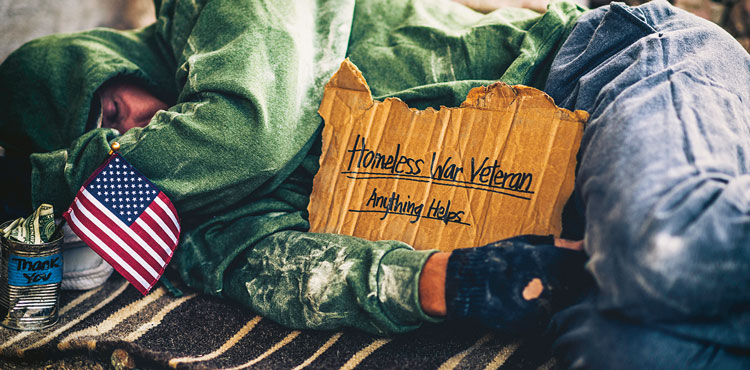ABA advocacy builds momentum for bipartisan legislation aiding homeless veterans

Photo by CatLane/Getty Images
Recent legislative developments in the nation’s campaign to end veteran homelessness is attributable in part to the persistent efforts of ABA members working in conjunction with the ABA’s Governmental Affairs Office. This was accomplished by showing lawmakers that the inability of low-income veterans to access free legal assistance only perpetuates the underlying problems that lead to homelessness.
Ending veteran homelessness became a national priority in 2010, and concerted efforts even managed to reduce homelessness by 50% from 2010 levels. Progress stalled, however, and veteran homelessness remains a persistent problem, with over 1.22 million veterans living in poverty and approximately 38,000 homeless on any given night, according to the Department of Veterans Affairs.
Fortunately, this may soon change, now that an increasing number of congressional leaders realize that for the many veterans with unresolved legal problems, access to a lawyer can mean the difference between living under a roof or under a bridge.
The reason is simple: Legal problems as basic as the loss of a driver’s license or overdue civil fines often disqualify veterans from participating in government and private-sector programs that provide housing, employment, benefits, treatment and services. Without legal assistance to resolve these problems, many low-income veterans are at an increased risk of becoming homeless, and those already living on the street are likely to remain there. This is highlighted by the VA’s own annual assessment, which repeatedly finds that half of the top 10 needs facing homeless veterans require legal assistance to be resolved.
At present, the VA does not have authority to directly fund legal services. While the VA provides indirect assistance, our country has relied on pro bono attorneys, legal aid lawyers and others to provide needed legal assistance. Despite those herculean efforts, thousands of veterans do not receive the aid that they need to get their lives back on track.
To help address this problem, interested stakeholders have partnered with the ABA and other legal groups to explore additional ways to expand access to legal services, and recent legislative developments in Congress seem promising.
The Homeless Veterans Prevention Act, championed by Sen. Richard Burr, R-N.C., for more than five years and endorsed by the ABA, would give the VA secretary the authority to provide legal help through private-public partnerships. Despite strong bipartisan support for the measure in the Senate, opposition in the House Committee on Veterans’ Affairs prevented its consideration in that chamber. But changes in House committee leadership this year could bring new opportunities to advance the legislation.
In 2016, to build House support for Burr’s plan, the ABA and the Ohio State Bar Association reached out to Reps. Joyce Beatty, D-Ohio, and Steve Stivers, R-Ohio, who have introduced similar legislation each Congress known as the Homeless Veterans Legal Services Act. Their bill has been a rallying point for ABA members and other advocates serving veterans to educate House members on the need for the changes.
It appears that persistence paid off, as their current bill was included in a subcommittee hearing in mid-July, marking the first action in the House on this critical issue.
The ABA’s Governmental Affairs Office is now cautiously optimistic that needed help for homeless veterans is within reach, thanks in large part to the efforts of concerned lawyers. But there is still work to do. If you would like to get involved and assist in passing this and other critical legislation, visit ambar.org/grassroots to register for the ABA Grassroots Action Center.
This article first appeared in the September-October 2019 issue of the ABA Journal under the headline “At Their Service.”
This report is written by the ABA’s Governmental Affairs Office and discusses advocacy efforts by the ABA relating to issues being addressed by Congress and the executive branch of the U.S. government. Eric Storey is director of grassroots and digital advocacy for the ABA.



